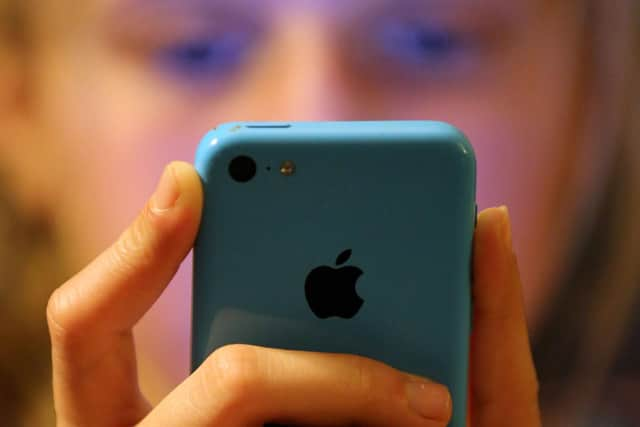Ian Ellis: Smartphones are a brilliant advance for humanity but come with perils too


Yet such advances can also have have the potential to cause damage to individuals or society as a whole.
New discoveries often can be used for beneficial or for detrimental purposes.
Advertisement
Hide AdAdvertisement
Hide AdUntil relatively recently, it was fanciful to think that one could drive a car while talking by phone to a relative or friend or colleague miles away, hands-free of course.
The fact that people can communicate with others at a distance from wherever they are is quite brilliant, and the internet-connected mobile phone – a smartphone – can be extremely useful in many different ways.
On the other hand, it is common knowledge that the online world carries harmful material of all sorts and indeed can be the source of very damaging scams.
When I last wrote about this subject in the News Letter (October 28, 2021), I compared the internet to the American, wild-west frontier experience – freedom and wide openness in a space that is difficult to regulate.
Advertisement
Hide AdAdvertisement
Hide AdLaw and lawlessness seem strangely to co-exist in that much fictionalised world.
The internet can be a place of great possibilities but at the same time a place of unwanted and dark dangers.
There has recently been some discussion in the media about giving children smartphones.
Of course, the main aim in doing so is to enable a child to get in touch with parents easily.
Advertisement
Hide AdAdvertisement
Hide AdHowever, because a smartphone provides access the internet, having one allows a child to enter that difficult to regulate world and potentially come to harm.
Much care is taken to protect children in the day to day world, but often there is not the same care concerning children in the cyber world.
Getting involved in social media brings particular risks for children, and online games can be very addictive.
A headteacher in London reportedly drew attention to how “screen-time” data on one pupil's smartphone showed that the child was spending an average of 14 hours a day looking at TikTok, Snapchat and YouTube.
Advertisement
Hide AdAdvertisement
Hide AdThe website of the Smartphone Free Childhood organisation (https://smartphonefreechildhood.co.uk), quotes the renowned American social psychologist and expert in this subject, Professor Jonathan Haidt, as having called the Smartphone Free Childhood movement "the beginning of the global tipping point in the fight back against a phone-based childhood".
The problem is that, if one child in a class has a smartphone, the pressure builds on other children's parents to provide their children with one.
So there needs to be agreement among parents to take appropriate action.
The fact that schools may be “mobile phone-free” does not mean that children will not want the devices to use outside school time.
Advertisement
Hide AdAdvertisement
Hide AdThe Smartphone Free Childhood website states: “97% of 12-year-olds in Britain have a smartphone. When children started getting them, there was no research about their impact. Now there is, and it’s overwhelming. Smartphones expose children to harmful content, raise the likelihood of developing a mental illness and are highly addictive.”
The aim of the organisation is to connect parents in their local communities so that together they can agree not to give their children smartphones until they are at least 14, and not to participate in social media before the age of 16.
Speaking on the BBC recently, Professor Haidt told of the “transformation of childhood that took place between 2010 and 2015”, adding: “Before then hardly any kids had a smartphone... By 2015 everything's changed. The great majority have a smartphone with a high-speed data plan.”
He said that children can often be online more than ten hours a day, and that when they are not online they are often thinking about it, with “phone-based childhood” blocking almost every avenue of childhood development, particularly through play and social skills.
Advertisement
Hide AdAdvertisement
Hide AdConsequently, he said, the rates of mental illness for boys and girls start going “up, up, up” from around 2013.
The academic added: “Once a phone comes into a child's life it will move to the centre of that child's life... We have to basically rip the smartphone out of the lives especially of kids up to the age of about 14.”
The UK's Online Safety Act 2023 helpfully sets minimum age restrictions on many social media platforms, as well as considerable penalties for companies not abiding by the law.
However, just as parents do not allow their children to roam our towns and cities unsupervised, equally they should not allow them to roam the internet similarly.
Advertisement
Hide AdAdvertisement
Hide AdIf parents feel that their child should have a mobile phone for emergency contact, the older-fashioned, and less expensive, mobiles that only allow phone calls and text messages, and do not have internet access, would seem to be the way to go.
Yet, while such phones are clearly less perilous than internet-access ones, they are still not entirely danger-free.
Canon Ian Ellis is a former editor of The Church of Ireland Gazette